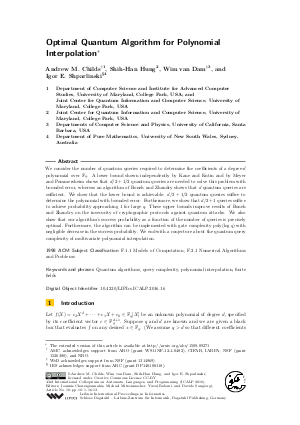Optimal Quantum Algorithm for Polynomial Interpolation
Authors Andrew M. Childs, Wim van Dam, Shih-Han Hung, Igor E. Shparlinski
-
Part of:
Volume:
43rd International Colloquium on Automata, Languages, and Programming (ICALP 2016)
Part of: Series: Leibniz International Proceedings in Informatics (LIPIcs)
Part of: Conference: International Colloquium on Automata, Languages, and Programming (ICALP) - License:
 Creative Commons Attribution 3.0 Unported license
Creative Commons Attribution 3.0 Unported license
- Publication Date: 2016-08-23
File

PDF
LIPIcs.ICALP.2016.16.pdf
- Filesize: 493 kB
- 13 pages
Document Identifiers
Subject Classification
Keywords
- Quantum algorithms
- query complexity
- polynomial interpolation
- finite fields
Metrics
- Access Statistics
-
Total Accesses (updated on a weekly basis)
0PDF Downloads0Metadata Views
Abstract
We consider the number of quantum queries required to determine the coefficients of a degree-d polynomial over F_q. A lower bound shown independently by Kane and Kutin and by Meyer and Pommersheim shows that d/2 + 1/2 quantum queries are needed to solve this problem with bounded error, whereas an algorithm of Boneh and Zhandry shows that d quantum queries are sufficient. We show that the lower bound is achievable: d/2 + 1/2 quantum queries suffice to determine the polynomial with bounded error. Furthermore, we show that d/2 + 1 queries suffice to achieve probability approaching 1 for large q. These upper bounds improve results of Boneh and Zhandry on the insecurity of cryptographic protocols against quantum attacks. We also show that our algorithm’s success probability as a function of the number of queries is precisely optimal. Furthermore, the algorithm can be implemented with gate complexity poly(log(q)) with negligible decrease in the success probability. We end with a conjecture about the quantum query complexity of multivariate polynomial interpolation.
Cite As Get BibTex
Andrew M. Childs, Wim van Dam, Shih-Han Hung, and Igor E. Shparlinski. Optimal Quantum Algorithm for Polynomial Interpolation. In 43rd International Colloquium on Automata, Languages, and Programming (ICALP 2016). Leibniz International Proceedings in Informatics (LIPIcs), Volume 55, pp. 16:1-16:13, Schloss Dagstuhl – Leibniz-Zentrum für Informatik (2016)
https://doi.org/10.4230/LIPIcs.ICALP.2016.16
BibTex
@InProceedings{childs_et_al:LIPIcs.ICALP.2016.16,
author = {Childs, Andrew M. and van Dam, Wim and Hung, Shih-Han and Shparlinski, Igor E.},
title = {{Optimal Quantum Algorithm for Polynomial Interpolation}},
booktitle = {43rd International Colloquium on Automata, Languages, and Programming (ICALP 2016)},
pages = {16:1--16:13},
series = {Leibniz International Proceedings in Informatics (LIPIcs)},
ISBN = {978-3-95977-013-2},
ISSN = {1868-8969},
year = {2016},
volume = {55},
editor = {Chatzigiannakis, Ioannis and Mitzenmacher, Michael and Rabani, Yuval and Sangiorgi, Davide},
publisher = {Schloss Dagstuhl -- Leibniz-Zentrum f{\"u}r Informatik},
address = {Dagstuhl, Germany},
URL = {https://drops.dagstuhl.de/entities/document/10.4230/LIPIcs.ICALP.2016.16},
URN = {urn:nbn:de:0030-drops-62985},
doi = {10.4230/LIPIcs.ICALP.2016.16},
annote = {Keywords: Quantum algorithms, query complexity, polynomial interpolation, finite fields}
}
Author Details
References
- Dave Bacon, Childs, Andrew M., and Wim van Dam. From optimal measurement to efficient quantum algorithms for the hidden subgroup problem over semidirect product groups. In Proceedings of the 46th IEEE Symposium on Foundations of Computer Science, pages 469-478, 2005. URL: http://arxiv.org/abs/arXiv:quant-ph/0504083.
- Robert Beals, Harry Buhrman, Richard Cleve, Michele Mosca, and Ronald de Wolf. Quantum lower bounds by polynomials. Journal of the ACM, 48(4):778-797, 2001. URL: http://arxiv.org/abs/arXiv:quant-ph/9802049.
-
Dan Boneh and Mark Zhandry. Quantum-secure message authentication codes. In Proceedings of Eurocrypt, pages 592-608, 2013.

-
François Charles and Bjorn Poonen. Bertini irreducibility theorems over finite fields. Journal of the American Mathematical Society, 29:81-94, 2016.

- Andrew M. Childs and Wim van Dam. Quantum algorithm for a generalized hidden shift problem. In Proceedings of the 18th ACM-SIAM Symposium on Discrete Algorithms, pages 1225-1234, 2007. URL: http://arxiv.org/abs/arXiv:quant-ph/0507190.
- Andrew M. Childs, Wim van Dam, Shih-Han Hung, and Igor E. Shparlinski. Optimal quantum algorithm for polynomial interpolation, 2015. URL: http://arxiv.org/abs/arXiv:1509.09271v2.
- Thomas Decker, Jan Draisma, and Pawel Wocjan. Efficient quantum algorithm for identifying hidden polynomials. Quantum Information and Computation, 9(3):215-230, 2009. URL: http://arxiv.org/abs/arXiv:0706.1219.
- Edward Farhi, Jeffrey Goldstone, Sam Gutmann, and Michael Sipser. Limit on the speed of quantum computation in determining parity. Physical Review Letters, 81(24):5442-5444, 1998. URL: http://arxiv.org/abs/arXiv:quant-ph/9802045.
- Daniel M. Kane and Samuel A. Kutin. Quantum interpolation of polynomials. Quantum Information and Computation, 11(1):95-103, 2011. URL: http://arxiv.org/abs/arXiv:0909.5683.
-
Arnold Knopfmacher and John Knopfmacher. Counting polynomials with a given number of zeros in a finite field. Linear and Multilinear Algebra, 26(4):287-292, 1990.

-
Serge Lang and André Weil. Number of points of varieties in finite fields. American Journal of Mathematics, 76:819-827, 1954.

- David A. Meyer and James Pommersheim. On the uselessness of quantum queries. Theoretical Computer Science, 412(51):7068-7074, 2011. URL: http://arxiv.org/abs/arXiv:1004.1434.
- Ashley Montanaro. The quantum query complexity of learning multilinear polynomials. Information Processing Letters, 112(11):438-442, 2012. URL: http://arxiv.org/abs/arXiv:1105.3310.
-
Gerald M. Pitstick, João R. Cruz, and Robert J. Mulholland. A novel interpretation of Prony’s method. Proceedings of the IEEE, 76(8):1052-1053, 1988.

-
Bjorn Poonen. Bertini theorems over finite fields. Annals of Mathematics, 160:1099-1127, 2004.

- Jaikumar Radhakrishnan, Pranab Sen, and S. Venkatesh. The quantum complexity of set membership. Algorithmica, pages 462-479, 2002. URL: http://arxiv.org/abs/arXiv:quant-ph/0007021.
-
Adi Shamir. How to share a secret. Communications of the ACM, 22(11):612-613, 1979.

- Wim van Dam. Quantum oracle interrogation: Getting all information for almost half the price. In Proceedings of the 39th IEEE Symposium on Foundations of Computer Science, pages 362-367, 1998. URL: http://arxiv.org/abs/arXiv:quant-ph/9805006.
